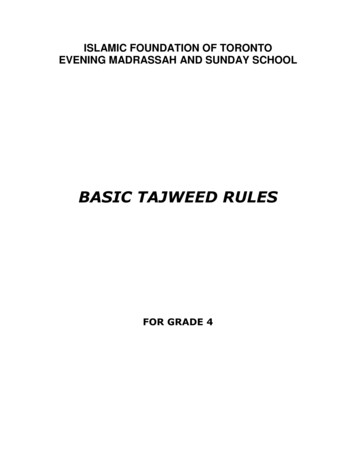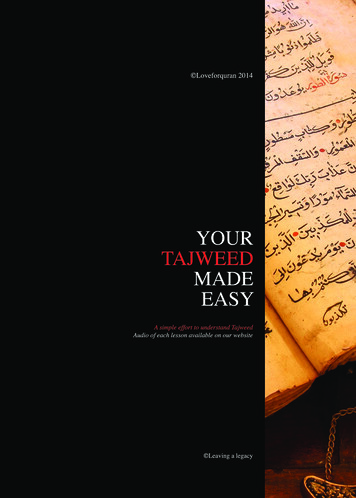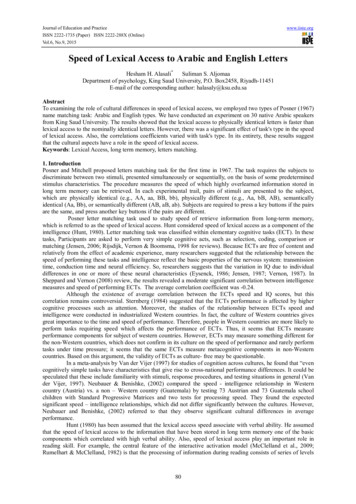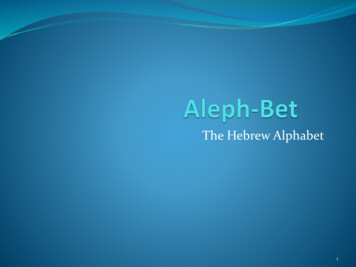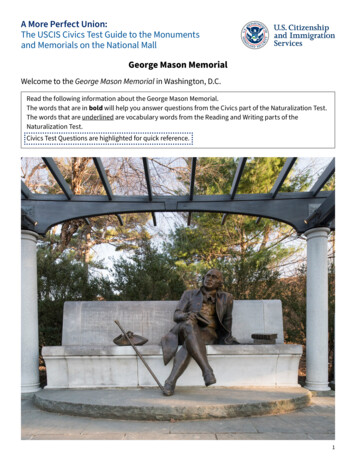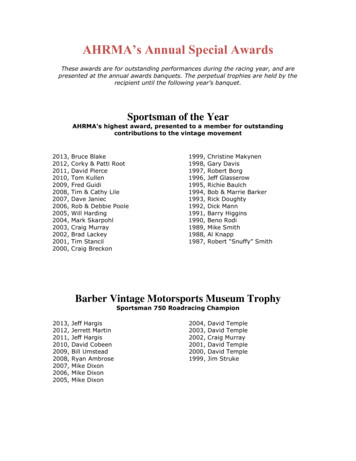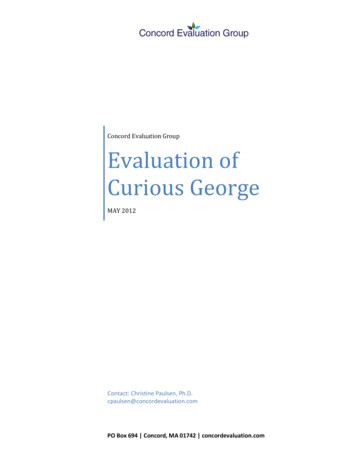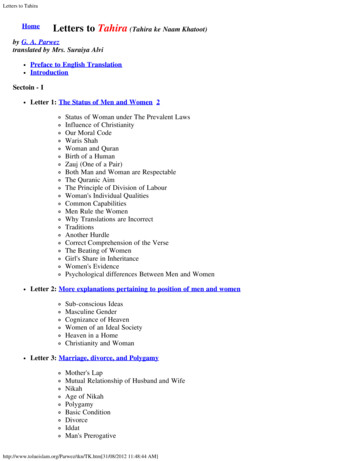
Transcription
References andRecommendationLettersTrachtenberg SchoolCareer Development ServicesCareer GuideMPA Suite 601www.career.tspppa.gwu.edutscareer@gwu.edu
Career GuideReferences and Recommendation LettersTable of ContentsReferences and letters of recommendationReferences and letters of recommendationSelecting a recommenderInformation to provide your recommender223Letters of recommendationAdditional information to provide your refereeDrafting a letter of recommendationOutline for a well-structured letterSample letter of recommendationSample fellowship recommendation456781
References and Recommendation LettersA reference or a letter of recommendation provides a potential employer, fellowship or degree programwith more information about you.Colleges and graduate schools usually require letters of recommendation during the admissions process,as do many fellowships; potential employers usually request a list of references that they can contact toask about you.A letter of recommendation is a written reference designed to offer information about your character andwork ethic. A list of references is a list of people (often former supervisors or professors) who know aboutyour work and can offer more perspective than an interview can about what you are like as an employee.Potential employers may contact references by email or telephone.Selecting a recommenderHow do you choose whom to ask for a letter of recommendation or reference?Remember that a recommendation anyone makes for you puts the reputation of therecommender on the line.a. Select a recommender who knows aspects of your skills, abilities and experience that arerelevant to the position/fellowship for which you are applying.b. If possible, select a recommender whom you have kept informed of your progress oversome period of time (holiday greetings, periodic email updates/check-ins).c. Select a recommender whom you believe agrees with and will support your chosen course ofaction (see (b) above). Ask them (see (e) below) for their perspective on your course of action.This will give you an idea of how supportive they can be.d. Particularly for letters of recommendation, make sure your recommender has enoughadvance notice and enough time to prepare a good letter of recommendation. (Keeptheir calendar in mind as well as your own - holidays and exams/grading periods are notgood times for writing letters of recommendation.)e. Send an advance email or make a brief phone call to ask your recommender for a reference ora letter of recommendation. Tell them what is involved with this specific position. For example, listing their nameand contact information; answering a call or email from a potential employer; writinga letter of recommendation due to be submitted by a specific date; filling in an on-linerecommendation form.BE ADVISED: On-line recommendation forms are the least flexible, mostburdensome and time consuming for your recommender, and give the leastopportunity for your recommender to fit their recommendation to your particularcapacities and situation.DO NOT expect the recommender to sort out the on line process. Lay it out forthem, for example: "You will receive an email from XYZ asking you to log on to ABCwebsite and fill out a form. I will send you a hard copy of the form so you can see whatis required."2
Information for your recommenderWhat information does your recommender need from you?The general rule is to MAKE IT EASY for the person to whom you are sending yourrequest for a reference/recommendation.a. Once someone agrees to provide a reference or letter of recommendation for you, follow upyour initial inquiry with information about the opportunity to which you are applying and yoursuitability for it. If you are requesting a letter of recommendation, this should be a detailed email(see next page). For a reference, a conversation or an email is fine. Make sure you tell yourreference anything you know about when, by whom, and how he or she can expect to becontacted, as well as the employer, the position and your suitability for it. You may find that youcontact a reference several times as you apply to more positions.This type of information lets the recommender know that you aren't just "shooting in the dark".Also, for a letter of recommendation, the referee will be able to draw on the statements fromyour letter to write the letter of recommendation, adding their appraisal of your suitability or specialqualification for the fellowship or job.b. After it is all over send the recommender an email or thank you note to let them knowthe outcome. It helps keep them updated on your situation in case you need help in thefuture, and it's just the polite thing to do.Why is it important to organize information for a referee writing a letter of recommendation?Every time you ask for a letter of recommendation, you (and many others at the same time) areasking a LOT of time of the referee. Writing several letters of recommendation for ONE student toSEVERAL different graduate institutions, for example, can take 6-8 hours, especially if your refereemust research his or her files for your grades and your research papers.A referee can sometimes use the same basic letter, but each one must be tailored. It is easy tomistakenly put a letter of recommendation for one institution or program into the envelope addressedto another, or forget to change the address to match the institution to which the letter ofrecommendation is going. Institutions and selection committees do receive letters of recommendationfor Fellowships that were directed to the wrong program. This tells the selection committees that theapplicant is pursuing other options as well, and makes the selection committee wonder how seriousthe applicant is about their program. Do everything possible to organize the papers andnecessary information for your referee.3
What additional information does a referee need to write a letter of recommendation?In your follow-up email to your referee, include:i.your resume, and if necessary or desirable any other pieces of paper that illustrate why youare a good candidate, for example, a research paper or a report on a related summerinternship, as attachmentsii.first paragraph stating what you want to apply for (name of Fellowship or positiononly), why you are asking them s p e c i f i c a l l y for a letter of recommendation orreference and that you hope they would be willing to recommend you (basically, ashort reiteration of your initial phone call or email).iii.a paragraph describing fellowship, the required qualifications, and the deadline for theletter of recommendation if you are requesting a letter of recommendation. If you think therecommender may not be familiar with the organization, include a sentence about whatthe organization is/does. DO NOT simply send an email with a link to a website, andrefer your referee to the site. It is time consuming for your recommender to go throughthe site to locate the core of the opportunity for YOU. You should do thatabstracting/summarizing in your letter. You can indicate a website "for further info."iv.one to two paragraphs on what your career or educational goals are and how thefellowship or job will help achieve them, as well as any other reasons why youspecifically are a good candidate and how you meet the fellowship's or job’srequirements.v.a final paragraph with the details of the letter of recommendation submission process orwhat your referee should expect. Does the referee return the letter ofrecommendation to you (in sealed, signed envelopes?), submit it on-line? etc. Providesubmission forms and if necessary, stamped, addressed envelopes.vi.a sincere thank you and statement that you will call/email to follow up in a few days.Call or email the referee to follow up. Ask them if they received your email and what theythink about this fellowship or position and how it fits your goals. Have a conversation. Thiscommunication may be longer or shorter depending on the content of your initial emailexchange or phone call to your potential recommender. The key is that the recommender needsto feel they know you well enough to make an honest appraisal of you and the appropriatenessof the fellowship or job for you in particular.4
Drafting a letter of recommendationWhy Ask Someone to Draft or Outline their own Letter of Recommendation?It is very common for referees to ask someone to draft or outline their own letter of recommendation.Sometimes a referee will write it entirely themselves but other times they will use the draft or outline youprovide as a basis and then add, delete, and edit the information from there. A referee may think veryhighly of you, and still ask for you to draft your own letter of recommendation to make sure he doesn’tleave out your important qualifications because he is busy.If your referee does not ask for a draft or outline of the letter of recommendation, you should stillprovide them with the information listed above for letters of recommendation. If they ask for adraft or outline, write a version of the letter that they could submit, although they may edit it.Letters of recommendation vary widely in content and form, but solid letters contain a number ofcommon traits.Remember: If you need five versions of the letter (say, for five different graduate programs), you don'tnecessarily need to write five separate letters. Application forms usually request the same type of information,and you simply need to create variations based on a template.MAKE A LIST - Write down a list of key phrases -- accomplishments and qualities -- you want to addresswithin the letter. Such a list will help you avoid the most common mistake made in these letters: vague,metaphoric writing. You want to provide concrete, convincing evidence.THINK ABOUT AND EVALUATE YOUR:1) Professional/Academic QualitiesAre you an effective leader, a visionary and forward thinker?Do you function as an active participant in a team setting?Are you a keen analytical thinker?Are you capable of conducting sophisticated research?2) Specific SkillsDo you communicate constructively, consistently and concisely?Do you have strong interpersonal or presentational skills?Fluency in certain languages?Digital or social media experience?Are you technologically savvy?Are you organized with meticulous attention to detail?3) Personal QualitiesDo you work well collaboratively with others?Are you flexible? Adaptable to change?Do you posses honesty/integrity/morality?Are you a highly motivated self-starter?Are you responsible, reliable, dependable?4) Past AccomplishmentsWhat are the principal two or three accomplishments you have achieved under this person’sguidance?5) Future PotentialWhat do you believe you are capable of achieving?5
Outline for a Well-Structured Letter That Covers All Main Points:INTRODUCTIONBegin the letter by clearly stating referee’s position, where they work, their relationship to you,and how long you have known and/or worked with one another (what context) and general“thesis” statement regarding your abilities/suitability for position.Give a general impression of yourself (as your referee) specific information on you and whyyou are qualified, what you can contribute, and why your referee is providing a letter ofrecommendation.BODYState your most noteworthy quality as it applies to this program or job position, and supportthat claim with a specific anecdote. How your skills match the position and target your letterof recommendation accordinglyFor instance, you might say that Sarah is, first and foremost, a born leader; Supportthat statement by telling a brief story about the time Sarah took the initiative to form apolicy task force to deal with a glitch in the company's computer system.Include additional relevant and compelling traits and back them up by offering examples thatclearly illustrate these qualities.CONCLUSIONState why you think your plans suit you (as your referee) and how you think you will contributeto the program or company.Strongly reaffirm your confidence in your abilities (as your referee) and conclude by tellingthe readers they should feel free to contact you (the referee) in case they need moreinformation. Don't forget to include their contact information beneath your signature andname.NOTES ABOUT THE FORMAT AND LENGTH:Do not handwrite the letter; type it or submit it online.Remember to have the referee also include complete contact information.The length of letters of recommendation varies greatly, but five paragraphs is usuallythe norm.On the same note, don't go overboard and churn out seven pages. Choose your content wisely,and remember that a concise letter is usually more effective than an overly verbose one.6
Sample Letter of RecommendationDear Selection Committee,When I think about a student who best exemplifies leadership and a commitment to socially responsiblemanagement, First Name Last Name is at the top of the list! Robert immediately and consistently has impressedme with his maturity, vision and personal sense of responsibility about making an impact in the world.During one of our first meetings, First Name talked about how he came to the Heller School to become theExecutive Director that he never had in his past work experiences. He/she had originally imagined himselfreturning to the non- profit field in this capacity but now through his academic coursework, leadership roles withNet Impact and expanded awareness of the shifting delineation between the public, private and non-profit sectors,his vision of his/her future is very different. There is such an animation in names’ face when he talks about SocialEnterprise and its current and potential global impact – it’s like he has discovered a whole new way to look at theworld and his role in this world. It’s always tremendous to see a student with such personal introspection,willingness to challenge him/herself and the ability to shift perspectives.With his/her seven years background in the nonprofit sector, including marketing, fundraising, programmanagement, and external relations at a diverse range of agencies, he/she brings a depth of experience andunderstanding to the MBA program; however, that is not what impresses me most about him/her. It is the mannerwith which he works to take initiative, problem solve and collaborate with students, faculty and staff. H e / s h ehas that unique capacity to balance experience, knowledge and emotional intelligence in a style that makes peoplewant to be a part of his team. What a wonderful trait!Based on all of this and more, I highly recommend First Name Last Name for this opportunity and truly lookforward to seeing what impact he continues to have in this world!Best regards,First Name Last NameDirectorCareer and Student Services111-333-3333; AFinley@brandeis.edu7
Sample Fellowship RecommendationTo Whom It May Concern:It gives me great satisfaction to recommend First Name Last Name for the McKenzie Fellowship in SpecializedJournalism. I was John’s professor in three undergraduate Communications courses and worked closely with him atboth our college radio station and campus video center.Like a number of my former students, First Name has kept in touch. Through his letters I stayed abreast ofhis/her television news career in Sacramento and witnessed his development as a professional journalist.It came as a wonderful surprise last year when he/she announced his/her intention to return to school forhis/her master’s degree. Knowing him/her I am sure he has exhibited the same enthusiasm for his graduatestudies as he/she did with us.First Name is highly charismatic and has a terrific on air presence. More importantly, he/she thinks critically,reasons well and has all the instincts of a good reporter.His grace under pressure became abundantly apparent to me during First Name’s junior year. First Name hosted ourweekly TV interview show, “Live on the Mall”, which is fed via closed circuit across the university. As First Namewas discussing campus politics with the president of the student government, a fire broke out in one of thedormitories. He/She immediately headed toward the blaze and began covering the story. Back at the video centerthe technician called all the local television stations, three of which wanted First Names feed and went live with itfor more than half an hour. The fire was quite unsettling and involved considerable damage as well as loss of life.First Name’s calm professionalism shown through so much that his feed was also picked up briefly by two nationalcable news channels.First Name also has a good feel for balanced and objective reporting. Case in point, while First Name was with us asupremacist group sprang up on campus. Although not sanctioned by the university, the group was allowed toconduct a rally. This drew protests from the vast majority of the student body. Nevertheless, First Name felt itimportant for freedom of speech to interview the group’s leaders on his show.The interview, conducted on the mall, drew a large demonstration with animosity directed not only at the group’sleaders but also at First Name. A number of First Name’s friends held this against him, but he unequivocallybelieved what he did was right. I would go so far as to say it was not only right but a reflection of maturejournalistic judgment.It was a real honor to witness First Name’s development here at the university and it has been a joy to watch hisgrowth since then. I cannot imagine a better recipient of this fellowship. I enthusiastically recommend him to you.Sincerely,First Name Last NameProfessor of Management and CommunicationsSyracuse co/sample.html8
Remember: If you need five versions of the letter (say, for five different graduate programs), you don't necessarily need to write five separate letters. Application forms usually request the same type of information, and you simply need to create variations based on a template.


